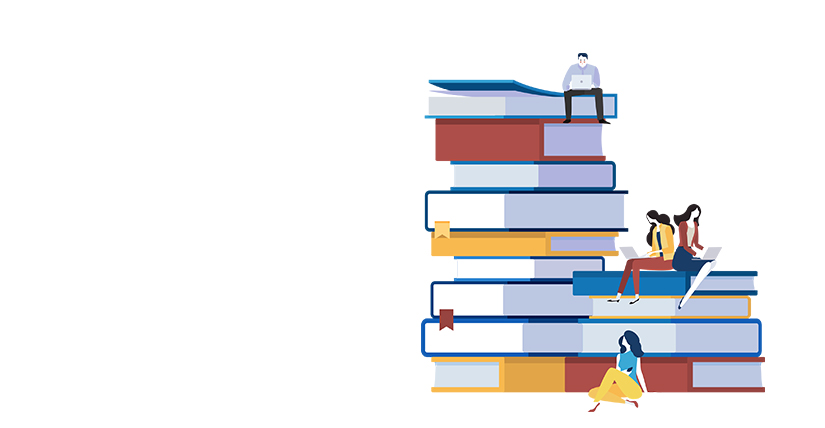This blog is contributed by Sushmita Das Chowdhury
If we really try to make an incisive analysis of the Indian Education System, then some immediate issues crop up which are both contemporary as well as traditional. We still persist in the conventional mode of learning and emphasize – the teaching techniques which have come down upon us through ages. Well, it may not altogether be wrong but we all need to appreciate that change is the only constant.
Alumni from the 1970-the 80s can also find similarities with the course curriculum and structure of the early 2000s. Although the syllabus has been revised quite a few times, the model of education remains unchanged. The same blackboard (in many cases whiteboards) based teaching method is still followed, where knowledge is passed in a lecturing manner rather than following a natural communicative way. It’s always a one-way interaction, which causes students to be skeptical to express their opinion and clarifying their doubts. Time has come to revamp our outlook towards the process of learning-teaching. This is the era of learning- outcome and learning-outcome must be collated with a professional outcome. Any change in the psycho-social order will have its telling upon the education scenario. Therefore, we need to adapt ourselves to such changes and respond accordingly.
Changes Made During Covid-19 Lockdown:
Indian Education System following its old school technique was moving well, but it came to a halt when the Covid-19 situation strikes hard. Due to this fact, the education system turned online. From Blackboard to Zoom meets and Google Classrooms, things changed faster. Class works and Home works are shared through file transfers or are uploaded in a portal, exams conducting online and knowledge sharing became virtual.
As the Covid-19 situation spread, parents became sceptical to send their ward off to school. They started preferring virtual learning more and felt secured. In a way or other, the Covid-19 situation has helped to flourish a few of the online education platforms such as – Vedantu, Upgrad, Byju’s, Unacademy, Udemy, etc. which uses virtual learning technique for knowledge sharing.
But is our education system as a whole smart enough to cope with this turmoil? Is our educator’s smart technology literate? If not, then let’s see what are they lacking and how can they overcome, below:
Issue 1: Can it upgrade with the current socio-economic changes?
The technological changes, such as Nanomedicines, 3D Printing, Robotics, etc. have amplified the need for skilled personnel in huge numbers. With the above-mentioned need, education systems bear the huge responsibility to cater to what’s required.
To deliver the same, educational institutes need to change the pedagogical practices in classrooms. They need to make students be lifelong learners. They need to train learners following 4C’s such as Critical Thinking, Communication, Creativity, and Collaboration through all their mentoring activities.
Issue 2: Are our trainers well-informed?
Due to traditional learning practices, our trainers/mentors/teachers are not always technologically informed. Moreover, due to orthodox teaching practices, teachers are not having a habit of following practical methods of learning.
To solve the above-said problem, professional development programs, such as Train the Trainers and Buddy Tutoring should be encouraged more. These programs are followed by authorities conducting IELTS, TOEFL, PTE testing, they invest in these development programs to keep their trainers/tutors skilled and up-to-date with the current trend in education.
These development programs teach trainers to incorporate learned strategies in lesson plans and to collaborate critical thinking and communication skills in their learning techniques. Also, due to this new learning trainers will be able to create a conducive learning environment and engage students in problem-solving and reflecting on their learning.
Nowadays, teaching is not only limited to a boundary, teachers/trainers should go beyond their classrooms, collaborate with other teachers/trainers and create new lesson plans or volunteer educating at remote places or in a remote way. Apart from teaching curriculum, teachers should also look after a child’s mental health, physical growth, and creative needs, through their “unorthodox teaching” style. They should move out of the classrooms, explore and assist students to learn more.
Issue 3: Are they incorporating 21st-century skills in their teaching?
It is extremely important to incorporate 21st-century skills such as communication skills, collaboration skills, people skills, digital efficacy, management skills, etc. with the core subjects taught in the institutes. The necessity of these skills will be realized, when a student can solve a jigsaw puzzle, put together knowledge on general awareness and various subjects, and apply it in solving real-life problems.
Education institutes are required to upgrade their teaching tools and teaching strategies to get the desired results of interesting and effective knowledge sharing, to engage the young generation in the learning process.
How is LNE different from other institutes?
We are LNE. LNE is our endeavour to improvise the e-learning scenario on a national level. The portal provides an integrated platform, serving a multitude of user-types such as students, faculties, educational institutes, universities, and coaching institutes. Our platform provides a one-stop solution for all the aforementioned entities. Students to search, register and join different courses. Students can explore thousands of courses.
OUR MISSION: To keep the education affordable for students, provide best information to students about courses. LNE trusts that everybody has the privilege to a world-class training. Recognizing the existing barriers in academia, we continue our efforts to curate an unparalleled collection of free online courses. To develop future leaders, managers and entrepreneurs world-wide through World class online educational portal.
OUR VISION: LNE will be a pioneer in combination of educating, learning and innovation. In addition, we will strengthen our preeminent programs and encourage the development of specific new programs that present strategic opportunities for all.
We, at LNE have been providing training on 21st century skills to develop and build a nation of skilled personnel who can turn into professional with rigorous work culture and scenario. The most mandatory skills taught here are listed below:
- Communication Skills – This means functional language, which incorporates speaking and listening skills.
- Critical Thinking Skills – This means thinking effectively and uniquely. Looking into problems from a different angle and executing plans in a proper manner. This also requires collaborating with others and negotiate when required.
- Digital Literacy Skills – This ultimately means to be aware of digitalization and being aware of different applications and their implications.
- Project Writing Skills – Properly analysing the problem in hand, writing the arguments, editing the concepts and finally presenting the idea with a structure.
And finally,
- Presentation Skills – Presenting your idea or concept through virtual media is the new-normal, this can be intimidating for few and rest can underestimate this skill. But effective presentation means engaging the structure of the presentation with the language.
All this information can be daunting for you. But don’t you worry, the courses offered by LNE, is created keeping in mind all the above-mentioned skills:
- SOFT SKILLS & COMPETENCY DEVELOPMENT
- PERSONALITY TRAIT ANALYSIS
- LEADERSHIP MANAGEMENT
- CONFLICT MANAGEMENT AND TEAM BUILDING
If you want to know more about the courses, click: https://lokenatheducation.com/list/14
It is of utmost importance that as you choose your course of study, you should also choose the right institute to impart that training to you.

Clinical Psychology Aspirant
